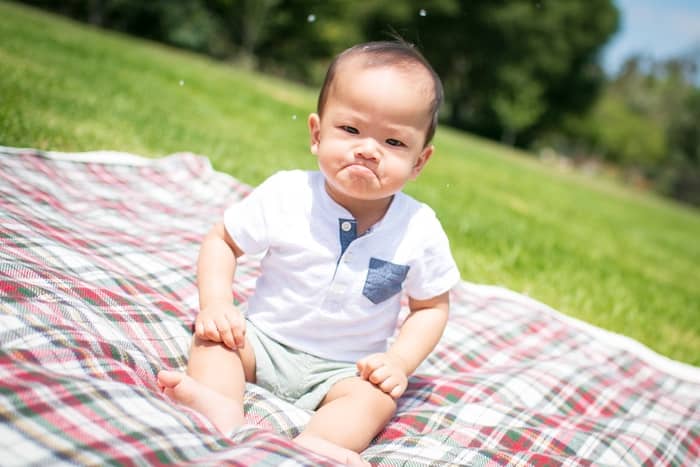Most babies start teething between 4 and 7 months old. Although there is no precise way to know when a baby is teething, there are some common signs that may indicate that your baby is teething: drooling, chewing on fingers or objects, irritability, reduced appetite, gum inflammation and reddening, and finally the eruption of teeth.

Does Baby Cry During Teething?
The answer to this question is a resounding, “It depends.” Some babies cry during teething, some babies don’t. There are a number of things that could contribute to your baby crying during teething, such as the level of discomfort they are feeling, the fact that their gums may be sore, or the fact that they may be extra fussy during this time.
When a baby’s first tooth begins to come in, it can often be accompanied by pain and soreness. Many babies will cry during the teething process, even if they don’t have any other symptoms of teething. There are a few things that may help make the process more comfortable for your baby:
- Gently rubbing their gums with a clean finger or a damp cloth can help relieve some of the discomfort.
- You can give your baby something cold to chew on, such as a teething ring or a piece of ice.
- Some babies find relief from specially-made teething tablets or gels.
- If your baby is eating solid foods, you can try giving them softer foods that are easier to chew.
Four Signs of a Teething Baby
During the teething process, babies will experience a number of different symptoms. While every baby is different and will experience these signs in their own way, there are four general signs that a baby is teething: drooling, gum pain, swollen gums
Drooling
A baby’s drooling can be one of the first signs that they are teething. The drool may be thick and stringy and can make the baby’s chin and clothes wet. Some babies also dribble saliva from their mouth.
Swollen and Painful Gum
For some babies, teething is painless and hardly noticeable. However, for other babies, teething can cause swollen and painful gums. One of the most common symptoms of teething is swollen gums. The gums may be red and tender to the touch, and they may bleed slightly when the baby brushes his or her teeth. In addition, the baby may have a fever, be irritable, and have trouble sleeping.

Refuse To Eat
When a baby is teething, it’s common for them to refuse to eat. This is usually due to the fact that their mouth is sore from the new teeth coming in. In most cases, the baby will eventually start eating again once the teething phase is over.
Until then, it’s important to make sure they’re getting enough fluids and nutrients from other sources. Breastmilk or formula can be given through a bottle or sippy cup, and there are also plenty of soft foods that can be given as well.
It’s important not to stress out about the baby not eating; just make sure they’re staying hydrated and getting enough nutrition in other ways.
Night Waking
If your baby is waking up during the night, it could be a sign that he or she is teething. A baby who is teething may wake up more frequently at night and have difficulty sleeping through the night. He or she may also have a fever, diarrhea, or swollen gums. If you think your baby is teething, ask your pediatrician for advice on how to help him or her sleep more comfortably.
When Do Babies Begin Teething?
The process of teething, when a baby begins to cut their first teeth, usually starts between the ages of four and twelve months. The first teeth to erupt through the gums are usually the bottom front teeth, followed by the top front teeth.
Some babies experience discomfort and mild swelling in their gums during teething, but this is not always the case. While there is no one right way for each baby to teethe, there are a few things parents can do to help make the process easier, such as providing soft foods that are easy to chew and giving infants cold objects to gnaw on.
In most cases, teething is a normal part of development and will eventually cause no more discomfort than a sore throat.
Conclusion
In conclusion, it appears that baby cry during teething. However, not all babies will cry and there is no definite way to tell whether or not a baby is teething other than watching for signs. If you are concerned that your baby may be teething, speak to your pediatrician about the best course of action.










